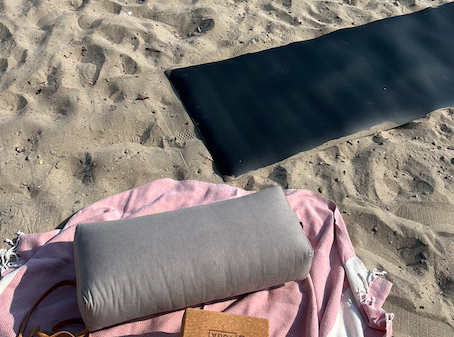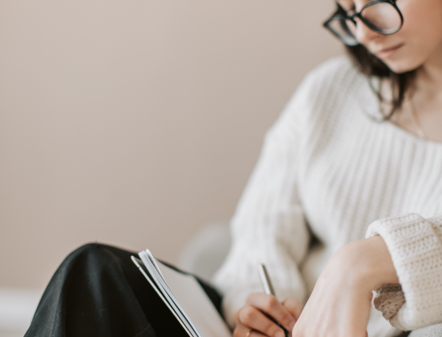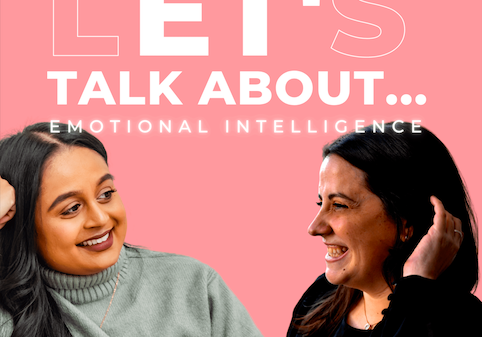What do you see when you look in the mirror? Do you see parts of yourself that you love? Do you see bright eyes and strong shoulders? Or do you see abs that could be more defined? Thighs that could be skinnier? Stretch marks that you wish would go away?
A movement is happening. It’s helping women learn to love their bodies, erasing the narrow-minded definition of what’s ‘beautiful’ nowadays. Magazine covers, Instagram feeds, and television screens are becoming more diverse and inclusive. They’re showing that women of all shapes and sizes are successful, worthy, and enough. However, the same mediums also encourage us to consume diet teas, lose five more pounds, and ‘earn a six pack before summer”. These conflicting messages create challenging conversations for all women with themselves, which become more complex and hard to interpret when recovering from an eating disorder, body dysmorphia, or an addiction to compulsive exercise.
In my life there’ve been toxic partners, unhealthy friendships, and challenging years with family members, but the most complicated and tumultuous relationship by far, has been with my own body.

Photo: Kristen Vizzari
Kids Just Being Kids
I was never a thin child growing up. I played baseball, took dance classes, and as kids did in the 80s and 90s, spent most nights running and playing in the streets of the neighbourhood. It wasn’t until those awkward years – between 12 and 14-years-old years old – that I started to look at my body through a slightly different lens.
During the difficult physical transition from child to young adult, I noticed that I wasn’t as skinny as some of my best friends. We ate the same food and did the same things, but they were smaller than me and we couldn’t share clothes like we used to. I was still holding onto baby weight. It bothered me, but it didn’t go deeper than a surface level observation. That is until one day in the eighth grade, when I suffered a trauma so hurtful that I didn’t feel its impact until years later.
“In my life there have been toxic partners, unhealthy friendships and challenging years with family members, but the most complicated and tumultuous relationship by far, has been the one with my own body.”
I was acting out a musical skit in front of my classmates and during my performance, I heard a boy say that I looked like a ‘beached whale’ in my overalls. I didn’t know how to process it. I was always confident regardless of my appearance because I knew that I was smart, creative, and capable. But, that moment changed me despite what I already knew about myself. His words were the only thing I heard, and I didn’t expect for them to echo throughout much of my adult life.
An eating disorder is a serious mental health condition marked by an obsession with food and body image. While eating disorders can affect both men and women, they’re found to be most prevalent amongst females aged 20-years-old and under. In a study conducted by non-profit organization National Eating Disorder Awareness (NEDA), 65% of people who’ve suffered from eating disorders say that bullying and childhood taunting contributed to their condition. I now know the truth to this statement.
Sticks And Stones
When the same boy who called me a “beached whale” asked me out a decade later, I discovered that the universe works in mysterious ways. I declined, and when I reminded him of what he said years earlier, he didn’t remember. He couldn’t recall the moment that could still make me cry and stir up endless emotions. It was cruel, undeserved, and unkind, but judging by the disgusted look on his face when I attempted to jog his memory, I knew that he meant none of it. He didn’t try to warp my psyche, burden me with a ‘body image complex’, or help perpetuate what would be a vicious cycle of me criticizing, abusing, and hating my own body.
And I don’t believe that most people do, mean it that is. They say things to fit in or be funny. They say things to protect themselves. But, what they don’t realize is that their words are powerful and impactful. The boy that I’ve mentioned isn’t the reason I have an eating disorder. I don’t blame him, but he did trigger something inside of me. His words contributed to it. They stuck with me, haunted me, and ever since that day in the eighth grade, I’ve consistently fought an internal battle against myself.

Photo: Kristen Vizzari
First Taste Of Control
I began working out in high school and shortly after, I was introduced to Hydroxycut and a stimulant called ephedrine through friends. If there were ever a time in my life that I needed an extra boost, it wasn’t at sixteen. I started seeing my ‘baby weight’ come off and immediately felt a huge sense of accomplishment. I watched what I ate, jumped on the low-fat bandwagon, and remained fairly happy with my self-image up until my second year of university.
Hello, freshman 15. Balancing work, school, homework, a social life, and the gym was all new to me and hard to manage. When you’re up all night writing papers, you tend to eat. Gaining a few pounds was the consequence. It was during this time that I was diagnosed with Gastroesophageal Reflux Disease (GERD). I know I contributed to it with my not-so-healthy lifestyle, but structurally, my esophageal valve was loose and needed to be reconstructed. The surgery was to be done laparoscopically with multiple tiny incisions, but the recovery was going to be long and challenging.
My post operative care required me to be on a strict liquid diet for two weeks, followed by a soft food diet for four to six weeks. It would be summer, so I thought I’d tan and live on smoothies. However, no amount of Ensure could’ve kept the weight on my already petite frame! A few weeks in, I had lost nearly 10 pounds. My stomach had shrunk and inturn, my appetite. My mom was worried, but the doctor assured her that I would gain weight once I returned to a normal diet. It’s unfortunate he made a promise he had absolutely no control over.
You see, control was my problem. As the weight continued to fall off, I felt an overwhelming sense of control and I loved it. I had power over what I chose to put in my body, so I stopped eating. It was easy to ignore and deny what was going on in my head because of the circumstance I was in after surgery. If I said that it hurt to eat, everyone believed me. Months passed and it got to a point where I could wear children’s clothes. I was in my early twenties and wearing a girl’s size 14 because a women’s double zero was too big. My family was distraught and suspicious, but like many others who’ve never been exposed to an eating disorder, they were unsure of how to proceed. I was an adult. They couldn’t ground me or force feed me, though they could institutionalize me. So, in a moment of desperation, my mother threatened to.
Afterward, I was mortified. The thought of not finishing school was a dealbreaker, so I ate. My plan was to eat just enough to get my family off my back, but my metabolism was destroyed and the weight piled on quicker than it had come off. My clothes no longer fit, my stretch marks were more visible, and I was in a body that I was embarrassed to call my own. If I had to eat, the only way to offset the calories was to exercise more. Some days, I would go to the gym for three hours. My muscles and bones were sore, but it was the only way I could have some control over how my body looked again. Burning so many calories would soon lead to binges, followed by long periods of guilt and shame.
Since I had gained some weight, my family assumed I was better. It’s an unfortunate and common misconception people have when dealing with a loved one suffering from an eating disorder, because physical appearance is the most visible symptom of the problem. I was also a very good liar. The truth was that I hated the way I looked, so I avoided social outings, pool parties, and nights out with friends because I wasn’t comfortable in my own skin. Fact is, people suffering from eating disorders and body dysmorphic disorders can’t control their negative thoughts and often isolate themselves to prevent being judged. And when it came down to it, I needed to go through all of this to recognize that I needed help. With that being said, my disorder prevented me from enjoying some of the best years of my life and for that, I’ll always be somewhat remorseful.
“Since I had gained some weight, my family assumed I was better. It’s an unfortunate and common misconception people have when dealing with a loved one suffering from an eating disorder, because physical appearance is the most visible symptom of the problem.”
Spiraling Out
Although depression and eating disorders are two separate illnesses, one condition can easily trigger the other. Overall, the National Institute of Mental Health (NIMH) estimates that up to 75 per cent of those with an eating disorder also suffer from depression or anxiety. When my weight plateaued, my body’s appearance was nowhere near where I wanted it to be, but I was getting used to being somewhere in the middle. And though it doesn’t make much sense given my mental state at the time, I began a relationship with someone I went to high school with.
Regardless of how I felt about myself, knowing that someone liked me increased my self-confidence. I indulged, hoping it would eventually have a more meaningful impact. It became nearly impossible to keep up my usual gym schedule when I factored in work, friends, and spending time with my new boyfriend. So, the excessive exercise stopped, and in turn the food limiting methods I’d implemented before returned. This continued for the next seven years. Looking back at photos of my ex-boyfriend and I, it’s easy to pinpoint the rough patches in our relationship. If we had a big fight, took a break, or broke up, I would restrict myself more. I would lose weight because in my mind, my self worth was directly related to the numbers on the scale and almost nothing else.
When we finally broke up, I became physically numb due to feelings of regret and guilt. I couldn’t eat, sleep, or carry a conversation without crying. My doctor recommended that I try antidepressants and anxiety medication to see if they could help me get back to a point where I could function like a ‘normal person’ – whatever that meant. My initial fear of taking medications was not that I would rely on them as the stigma surrounding pharmaceuticals suggests, though I was terrified of their side effect: weight gain. This was my rock bottom. Thankfully, I had an incredible support system of people who’d been down this road with me once before. They never faltered in trying to help me recover despite the fact that I secretly suffered through it all.
Eight months after starting to take the medication my doctor recommended, I stopped. I still believe I made the right decision to stay off the pills because they got me through the days and allowed me to get back to a headspace that wasn’t clouded with pain. They helped me get out of bed, get to my doctor’s appointments, go to work, engage in conversations that were once uncomfortable, and recognize my long standing issues surrounding control, crisis, and body image. Most importantly, they helped me to begin my own healing process.

Photo: Kristen Vizzari
Forget the Destination, Focus on Journey
It’s now been six years since I came to that realization. There’s more good days than bad, but when you’ve suffered from body dysmorphia, eating, and compulsive exercise disorders, you can’t always switch them off. Not completely. The switch is often replaced with a dimmer and there’s triggers everywhere.
No matter how much progress you’ve made in recovery, there’s periods of darkness. Though it’s in those periods of darkness that you can wallow or you can make the choice to navigate with the tools and strategies you’ve learned along the way. Recovery is a journey and 20 years in, I’m still going through the process. I still struggle. I catch myself caring about dress size, avoiding the scale, and getting anxious about not being able to exercise on vacation. The difference is that I no longer obsess over these things. I eat when I’m hungry and I exercise for my physical, emotional, and mental well-being. It’s not perfect, but it’s a much healthier relationship than before.
While I no longer feel the mental effects of my disorder on a daily basis, I do live with the physical consequences. I’m borderline anemic, I have malabsorption issues, and irritable bowel syndrome. While the specialists I’m seeing assure me that my reproductive system is within normal range for my age, I still live with a subtle fear that I damaged it. These are things you don’t think about when you’re 12 or 14-years-old, but dealing with them and making peace with the fact that they’re a reality you played a role in creating is enough.
It has taken time, commitment, forgiveness, and practice, but I can finally say that my body doesn’t define me. It’s a part of me, a component of my whole being and whole self. It’s a vessel that I need to nourish, strengthen and care for, but it’s not the reason that I’m kind, intelligent, or loved. I’m worthy simply because I am.
Eating disorders, compulsive exercise addiction, and body dysmorphic disorder are complex conditions with different causes, triggers, symptoms, and treatment plans. If you or anyone you care about is suffering, resources are available and recovery is possible. Start looking for help here.












You must be logged in to post a comment Login